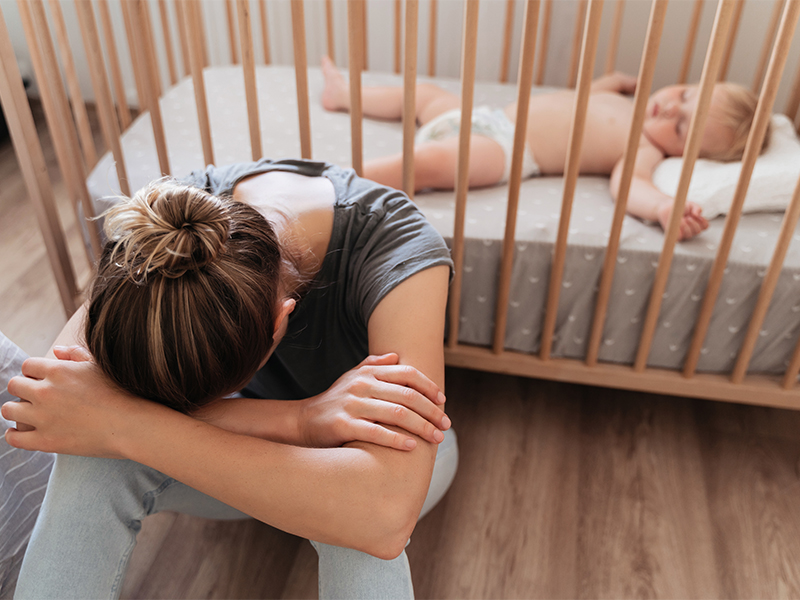Hong Kong clinical psychologist DR QURATULAIN ZAIDI of Mind N Life looks at the issue of postnatal depression – symptoms, signals and how it can affect not just new mums but their partners too.
What is postnatal depression?
Postnatal depression (PND) is a type of depression that many parents experience after having a baby. It’s a common mood disorder, affecting an estimated 15 to 18 percent of women within a year of giving birth (as many as 20 to 40 percent of women in less developed countries). Thirty percent of these had anxiety or a depressive mood disorder previously.
While many new mothers experience a bout of “baby blues” – a brief period of feeling low, emotional and tearful after giving birth – it doesn’t last for more than two weeks. Postnatal depression, on the other hand, can start any time in the year after giving birth and may begin gradually or suddenly. It can range from mild to severe. (The terms “postpartum” and “postnatal” are often used interchangeably – “postpartum” refers to issues pertaining to the mother while “postnatal” refers to those concerning the baby.)
Predisposing factors in postnatal depression can include previous mental health disorders (often undiagnosed), biological causes, a lack of support, a difficult childhood experience or the experience of abuse, low self-esteem, stressful living conditions and major life events.

Symptoms of postnatal depression
10 physical symptoms of postnatal depression to look out for
- a churning feeling in your stomach
- feeling light-headed, dizzy or nauseous
- pins and needles
- panic attacks or feeling restless or unable to sit still
- headaches, backache or other aches and pains
- faster breathing or a fast, thumping or irregular heartbeat
- sweating or hot flushes
- sleeplessness
- grinding your teeth, especially at night
- changes in your sex drive
10 emotional signals of postnatal depression to look out for
- feeling tense, nervous or unable to relax
- having a sense of dread, or fearing the worst
- feeling like the world is speeding up or slowing down
- feeling like other people can see you’re anxious and are looking at you
- worrying about anxiety itself (for example, about when panic attacks might happen)
- wanting reassurance from others or worrying they’re angry or upset with you
- worrying you’re losing touch with reality
- worrying about the future
- rumination: thinking about bad experiences or situations
- depersonalisation/derealisation – feeling disconnected from mind or body, or from the world around you
Impact on both parents
Only people who have given birth in the past year can be formally diagnosed with postnatal depression. Yet, increasingly studies are showing partners can also experience anxiety or depression. Childbirth is a huge life change for both members of a relationship; dealing with a lack of sleep, extra household responsibilities and financial worries makes it a period of adjustment that can be very difficult for the partner too.
In fact, it’s estimated that around 10 percent of fathers are depressed in the first year after birth, a rate twice as high as depression in the general male population. Some research has indicated the figure could be too low, and that in the three- to six-month period after birth, around one in four fathers exhibit symptoms of depression. A review published in June 2022, which looked at nearly 30,000 couples from 15 countries, found that in three in 100 families both the mother and father experienced postnatal depression at the same time.
Risk factors also can make some fathers more prone to PND. One is their partner’s mental health; the risk of the father developing PND is more than five times higher if the mother has it. (Similarly, there is evidence that paternal depression leads to increased symptoms of postnatal depression in mothers during pregnancy and in the first six months postpartum.) Other risk factors include lack of job stability, the pregnancy being unintended, poor relationship satisfaction, having a lack of information about pregnancy and birth, less social support, sleep deprivation, and having unrealistic expectations of fatherhood.
Impact on the child
Research studies show that postpartum depression in a mother can affect her child throughout childhood. This impact might be seen in one or more ways, including:
- delays in language development and learning challenges in academic settings;
- challenges with early secure attachment;
- behavioural, psychological, social and psychological challenges;
- increased crying or agitation;
- shorter height and higher risk of obesity in preschoolers; and
- problems dealing with stress and adjusting to school and other social situations. What’s more, untreated postpartum depression can affect your ability to parent.
You may:
- not have enough energy;
- have trouble focusing on the baby’s needs and your own needs;
- feel moody;
- not be able to care for your baby; or
- have a higher risk of attempting suicide.
Feeling like a bad mother can make depression worse – and that’s why it’s so important to get help
What helps
As we’ve seen, If left untreated, PND can have a long-term impact on the parents’ relations and the child’s development. That’s why early intervention is key for the benefit of the whole family. This life transition can be a joyful yet stressful time, so being prepared is helpful too – and pre-emptive measures can decrease the severity of negative impacts.
One key is for parents to recognise and pay attention to their emotional state. This is very important, as you’re the only one who knows how you are feeling. Many people don’t realise they have PND because it can develop gradually. You should also talk openly to your partner about any issues – from how you’ll approach the matter of sleep (what’s the plan for getting up in the middle of the night when the baby cries?) to how you might handle any potential visits from in-laws.
You should also invest in your relationship with your partner, even at a time when life seems almost totally consumed by the baby. Make time for each other – plan weekly date nights and make it an opportunity to talk about other things as well as your growing family.
Use your social network and reach out to friends who’ll be able to support you without judgement. You could also join a support group – hearing from women who are going through the same stages of being a mum can help you to know that you are normal. Do be aware, however, of the risks of comparing – don’t “compare and despair” when it comes to your baby and anyone else’s. In the same way, dads should reach out to their individual network if they feel they need support.
Incorporate daily activities you love (and try to outsource things you don’t enjoy doing!). Exercise can be a great way to boost energy; if you don’t want to do anything too rigorous, try a pre-dinner walk with spouse and baby. This activity alone can change the brain chemistry and produces chemicals that are so helpful for your mood.
Finally, it’s very useful to maintain some perspective. You and your partner should remind yourselves that this phase of the baby’s dependency on you is temporary – it will pass; they grow up so quickly, so enjoy them. Have patience, too; the joys of having children far outweigh the stresses. Above all, though, be honest with yourself, and seek help if you are struggling.
Dr Zaidi is a British-registered clinical psychologist in Hong Kong who works with individuals, couples and families in her private practice in Central, and as a mental health consultant for a number of NGOs and international corporations.
2521 4668 | info@mindnlife.com
mindnlife.com
This article first appeared in the Spring 2023 issue of Expat Living magazine. Subscribe now so you never miss an issue.







